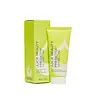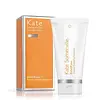What's inside
What's inside
 Key Ingredients
Key Ingredients

 Benefits
Benefits

 Concerns
Concerns

 Ingredients Side-by-side
Ingredients Side-by-side

Aloe Barbadensis Leaf Juice
Skin ConditioningPyrus Malus Juice
Skin ConditioningVitis Vinifera
MaskingGlycerin
HumectantCellulose
AbsorbentCaprylic/Capric Triglyceride
MaskingCetyl Esters
EmollientStearyl Alcohol
EmollientHelianthus Annuus Seed Oil
EmollientGlyceryl Stearate
EmollientHydroxypropyl Starch Phosphate
Microcrystalline Cellulose
AbsorbentDiheptyl Succinate
EmollientGluconolactone
Skin ConditioningTartaric Acid
BufferingIris Pallida Leaf Cell Extract
AntioxidantGlycolic Acid
BufferingPhytic Acid
Hydrolyzed Hyaluronic Acid
HumectantSalix Alba Bark Extract
AstringentLactobacillus
Skin ConditioningLactobacillus Ferment
Skin ConditioningHydrolyzed Viola Tricolor Extract
Skin ProtectingMicrocitrus Australasica Fruit Extract
Lactobacillus Ferment Lysate
Skin ConditioningJuniperus Virginiana Oil
MaskingCapryloyl Glycerin
Citrus Aurantium Dulcis Peel Oil
MaskingSalvia Sclarea Oil
MaskingCoco-Glucoside
CleansingPanthenyl Triacetate
Xanthan Gum
EmulsifyingTetrasodium Glutamate Diacetate
Hydroxypropylcellulose
EmulsifyingSodium Hydroxide
BufferingTriethyl Citrate
MaskingCalcium Gluconate
HumectantCocos Nucifera Fruit Extract
EmollientEthyl Linalool
MaskingSodium Benzoate
MaskingLimonene
PerfumingAloe Barbadensis Leaf Juice, Pyrus Malus Juice, Vitis Vinifera, Glycerin, Cellulose, Caprylic/Capric Triglyceride, Cetyl Esters, Stearyl Alcohol, Helianthus Annuus Seed Oil, Glyceryl Stearate, Hydroxypropyl Starch Phosphate, Microcrystalline Cellulose, Diheptyl Succinate, Gluconolactone, Tartaric Acid, Iris Pallida Leaf Cell Extract, Glycolic Acid, Phytic Acid, Hydrolyzed Hyaluronic Acid, Salix Alba Bark Extract, Lactobacillus, Lactobacillus Ferment, Hydrolyzed Viola Tricolor Extract, Microcitrus Australasica Fruit Extract, Lactobacillus Ferment Lysate, Juniperus Virginiana Oil, Capryloyl Glycerin, Citrus Aurantium Dulcis Peel Oil, Salvia Sclarea Oil, Coco-Glucoside, Panthenyl Triacetate, Xanthan Gum, Tetrasodium Glutamate Diacetate, Hydroxypropylcellulose, Sodium Hydroxide, Triethyl Citrate, Calcium Gluconate, Cocos Nucifera Fruit Extract, Ethyl Linalool, Sodium Benzoate, Limonene
Water
Skin ConditioningLactic Acid
BufferingSilica
AbrasiveGlycine Soja Oil
EmollientPectin
Emulsion StabilisingCetearyl Alcohol
EmollientCarica Papaya Fruit
Skin ConditioningCeteareth-20
CleansingCetyl Alcohol
EmollientPhenoxyethanol
PreservativeDehydroxanthan Gum
Emulsion StabilisingGlyceryl Stearate
EmollientPEG-100 Stearate
Salicylic Acid
MaskingLactobacillus/Pumpkin Ferment Extract
Skin ConditioningAlcohol Denat.
AntimicrobialSorbic Acid
PreservativeCinnamal
PerfumingMel
EmollientCitrus Aurantium Bergamia Fruit Oil
MaskingEugenol
PerfumingPotassium Sorbate
PreservativeLimonene
PerfumingLinalool
PerfumingLavandula Angustifolia Oil
MaskingBeta-Carotene
Skin ConditioningAloe Barbadensis Leaf Juice Powder
Skin ConditioningBromelain
Skin ConditioningPapain
Skin ConditioningRetinyl Palmitate
Skin ConditioningTocopheryl Acetate
AntioxidantCinnamomum Cassia Leaf Oil
MaskingAcetic Acid
BufferingPogostemon Cablin Leaf Oil
MaskingPelargonium Graveolens Flower Oil
MaskingAniba Rosaeodora Wood Extract
MaskingCitrus Aurantium Dulcis Peel Oil
MaskingCI 75810
Cosmetic ColorantWater, Lactic Acid, Silica, Glycine Soja Oil, Pectin, Cetearyl Alcohol, Carica Papaya Fruit, Ceteareth-20, Cetyl Alcohol, Phenoxyethanol, Dehydroxanthan Gum, Glyceryl Stearate, PEG-100 Stearate, Salicylic Acid, Lactobacillus/Pumpkin Ferment Extract, Alcohol Denat., Sorbic Acid, Cinnamal, Mel, Citrus Aurantium Bergamia Fruit Oil, Eugenol, Potassium Sorbate, Limonene, Linalool, Lavandula Angustifolia Oil, Beta-Carotene, Aloe Barbadensis Leaf Juice Powder, Bromelain, Papain, Retinyl Palmitate, Tocopheryl Acetate, Cinnamomum Cassia Leaf Oil, Acetic Acid, Pogostemon Cablin Leaf Oil, Pelargonium Graveolens Flower Oil, Aniba Rosaeodora Wood Extract, Citrus Aurantium Dulcis Peel Oil, CI 75810
Ingredients Explained
These ingredients are found in both products.
Ingredients higher up in an ingredient list are typically present in a larger amount.
Citrus Aurantium Dulcis Peel Oil is oil from the peel of an orange fruit.
Limonene and linalool make up the majority of oils from citrus peels. Limonene has a "citrus" fragrance. Citrus peels also contain flavonoids, which have anti-inflammatory properties.
Citrus peel is also a rich source of flavonoids. Flavonoids are natural antioxidants and help protect your skin against damage. Flavonoids are a group of compounds naturally found in vegetables and fruits.
The term 'fragrance' is not regulated in many countries. In many cases, it is up to the brand to define this term. For instance, many brands choose to label themselves as "fragrance-free" because they are not using synthetic fragrances. However, their products may still contain ingredients such as essential oils that are considered a fragrance.
Learn more about Citrus Aurantium Dulcis Peel OilGlyceryl Stearate is a mix of glycerin and stearic acid.
It is used to stabilize the mixing of water and oil ingredients. By preventing these ingredients from separating, it can help elongate shelf life. It can also help thicken the product's texture.
As an emollient, it helps soften skin and supports barrier-replenishing ingredients.
In cosmetics, Glyceryl Stearate is often made from vegetable oils or synthetically produced.
This ingredient may not be fungal-acne safe
Fun fact: The human body also creates Glyceryl Stearate naturally.
Learn more about Glyceryl StearateLimonene is a fragrance that adds scent and taste to a formulation.
It's found in the peel oil of citrus fruits and other plants such as lavender and eucalyptus. The scent of limonene is generally described as "sweet citrus".
Limonene acts as an antioxidant, meaning it helps neutralize free radicals.
When exposed to air, oxidized limonene may sensitize the skin. Because of this, limonene is often avoided by people with sensitive skin.
The term 'fragrance' is not regulated in many countries. In many cases, it is up to the brand to define this term. For instance, many brands choose to label themselves as "fragrance-free" because they are not using synthetic fragrances. However, their products may still contain ingredients such as essential oils that are considered a fragrance.
Learn more about Limonene